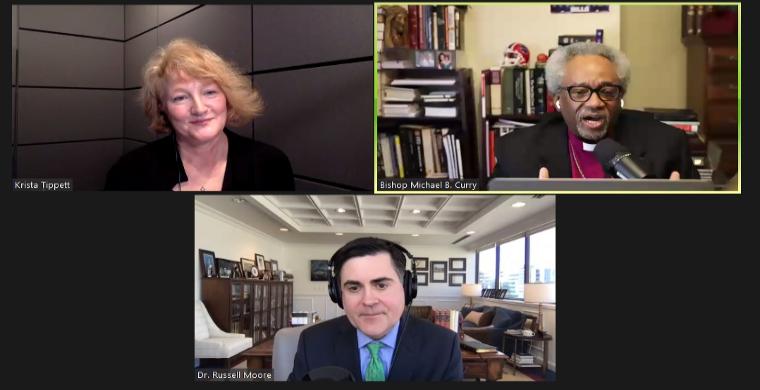Episcopal Cathedral Hosts Moore, Curry on Healing National Divide
By Jeffrey Walton
www.juicyecumenism.com
November 23, 2020
Two prominent officials in the Evangelical Christian and Mainline Protestant Christian traditions met and jointly fielded questions about engaging amidst difference in a contentious period shaped by protests and an especially divisive U.S. Presidential election.
Southern Baptist ethicist Dr. Russell Moore and Episcopal Church Presiding Bishop Michael Curry appeared online together on Friday, November 20 to discuss faith, compassion, and the healing of national divides.
The virtual webconference was sponsored by the Episcopal Church's Washington National Cathedral and the National Institute for Civic Discourse at the University of Arizona.
Moderated by broadcaster Krista Tippett, Founder of the On Being Project, the discussion was cordial but also revealed differences. Curry is widely known for his homily at the 2018 royal wedding of the Duke and Duchess of Sussex, in which he emphasized that "love is the way." His appearance on the webconference revisited similar themes.
Curry asked that people learn to live with differences, citing disastrous consequences for the brothers Cain and Abel in the book of Genesis.
Moore, Director of the Southern Baptist Convention's Ethics and Religious Liberty Commission, the public policy office of the largest Protestant denomination in the United States, sought to define vocabulary. Asked about civility by Tippett, Moore took issue with the term.
"Sometimes when we say civility what we mean is pretending that we don't have differences and being polite," Moore noted. "We need to have more debate, not less."
Asked about how to converse amid difference, Curry pointed to his 40-year marriage with his wife and about learning to disagree, saying that "learning to live in grace with difference is called maturity."
"There is something in fallen human nature that wants to be protective," Moore said. "One of the ways that we can get around that is to try to find a small area of common agreement and then work out from that."
Moore cited a conservative view of evangelism as a unifying, rather than divisive, point.
Those who are in conversation with their neighbors "tend to be people who are loving and not demonizing their neighbors," Moore proposed. "Very few of us believe that anyone else can be persuaded, but the hope of transformation in the Gospel makes that possible."
Referencing a previous Anglican Communion primates' (national church leaders) meeting as a "difficult time" Curry shared about a fellow Anglican primate he was in deep disagreement with whom the two covenanted to pray for one another.
Moore noted that division is to be expected, saying that "if we really do believe that there is a day of judgment, then we have to speak honestly about that."
"That doesn't mean that we have to evaporate arguments," Moore added. "We can have very strong disagreements and arguments and still listen to one another in a public arena."
The discussion took place in the context of an especially contentious national election, with questions submitted by people struggling to understand or charitably respond to perceived opponents. Both Moore and Curry largely steered away from the immediate political moment, instead citing scripture and lessons learned from family.
"What kind of person do I want to be?" Curry asked. "What is the living legacy? Whom am I going to follow? I believe the way of Jesus is a challenge. It is about giving self for the greater good."
Justice by itself is not enough, the Episcopal Church bishop challenged. "Justice without love can turn into revenge and that does not reflect the kingdom and reign of God."
Both Moore and Curry shared optimism about the younger generation, with Moore speaking positively about young evangelical Christians as "immediately counter-cultural" and not expecting to be understood.
"I find a great resilience," Moore stated, adding that for young people the desire is for consistency.
"The question is not 'why do you believe?' so much, the question is 'why are you not living up to what you say you believe?'" Moore said.
Curry was hopeful about young activists engaged in street protests across recent months.
"What they were protesting was that we were not living up to the values we say we are -- they were challenging us to be whom we say we are," Curry said.
END














